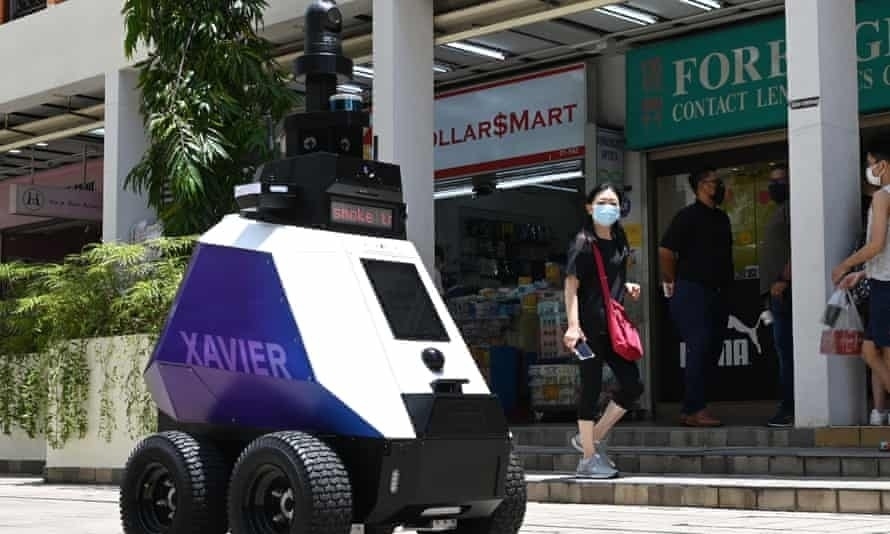- People seem not to see that their opinion of the world is also a confession of character
- We have it in our power to begin the world over again
- There is no creature whose inward being is so strong that it is not greatly determined by what lies outside it
- The old is dying and the new cannot be born
Singapore is turning into a dystopian surveillance state
Well, this is concerning. Especially given governments' love for authoritarian technologies and copying one another’s surveillance practices.
Singapore has trialled patrol robots that blast warnings at people engaging in “undesirable social behaviour”, adding to an arsenal of surveillance technology in the tightly controlled city-state that is fuelling privacy concerns.Source: ‘Dystopian world’: Singapore patrol robots stoke fears of surveillance state | Singapore | The GuardianFrom vast numbers of CCTV cameras to trials of lampposts kitted out with facial recognition tech, Singapore is seeing an explosion of tools to track its inhabitants.
[…]
The government’s latest surveillance devices are robots on wheels, with seven cameras, that issue warnings to the public and detect “undesirable social behaviour”.
This includes smoking in prohibited areas, improperly parking bicycles, and breaching coronavirus social-distancing rules.
During a recent patrol, one of the “Xavier” robots wove its way through a housing estate and stopped in front of a group of elderly residents watching a chess match.
“Please keep one-metre distancing, please keep to five persons per group,” a robotic voice blared out, as a camera on top of the machine trained its gaze on them.
Arguing that you don't care about the right to privacy because you have nothing to hide is no different than saying you don't care about free speech because you have nothing to say
Post-pandemic surveillance culture
Today's title comes from Edward Snowden, and is a pithy overview of the 'nothing to hide' argument that I guess I've struggled to answer over the years. I'm usually so shocked that an intelligent person would say something to that effect, that I'm not sure how to reply.
When you say, ‘I have nothing to hide,’ you’re saying, ‘I don’t care about this right.’ You’re saying, ‘I don’t have this right, because I’ve got to the point where I have to justify it.’ The way rights work is, the government has to justify its intrusion into your rights.
Edward Snowden
This, then, is the fifth article in my ongoing blogchain about post-pandemic society, which already includes:
It does not surprise me that those with either a loose grip on how the world works, or those who need to believe that someone, somewhere has 'a plan', believe in conspiracy theories around the pandemic.
What is true, and what can easily be mistaken for 'planning' is the preparedness of those with a strong ideology to double-down on it during a crisis. People and organisations reveal their true colours under stress. What was previously a long game now becomes a short-term priority.
For example, this week, the US Senate "voted to give law enforcement agencies access to web browsing data without a warrant", reports VICE. What's interesting, and concerning to me, is that Big Tech and governments are acting like they've already won the war on harvesting our online life, and now they're after our offline life, too.
I have huge reservations about the speed in which Covid-19 apps for contact tracing are being launched when, ultimately, they're likely to be largely ineffective.
We already know how to do contact tracing well and to train people how to do it. But, of course, it costs money and is an investment in people instead of technology, and privacy instead of surveillance.
There are plenty of articles out there on the difference between the types of contact tracing apps that are being developed, and this BBC News article has a useful diagram showing the differences between the two.
TL;DR: there is no way that kind of app is going on my phone. I can't imagine anyone who I know who understands tech even a little bit installing it either.
Whatever the mechanics of how it goes about doing it happen to be, the whole point of a contact tracing app is to alert you and the authorities when you have been in contact with someone with the virus. Depending on the wider context, that may or may not be useful to you and society.
However, such apps are more widely applicable. One of the things about technology is to think about the effects it could have. What else could an app like this have, especially if it's baked into the operating systems of devices used by 99% of smartphone users worldwide?

The above diagram is Marshall McLuhan's tetrad of media effects, which is a useful frame for thinking about the impact of technology on society.
Big Tech and governments have our online social graphs, a global map of how everyone relates to everyone else in digital spaces. Now they're going after our offline social graphs too.
Exhibit A
The general reaction to this seemed to be one of eye-rolling and expressing some kind of Chinese exceptionalism when this was reported back in January.
Exhibit B
Today, this Boston Dynamics robot is trotting around parks in Singapore reminding everyone about social distancing. What are these robots doing in five years' time?
Exhibit C
Drones in different countries are disinfecting the streets. What's their role by 2030?
I think it's drones that concern me most of all. Places like Baltimore were already planning overhead surveillance pre-pandemic, and our current situation has only accelerated and exacerbated that trend.
In that case, it's US Predator drones that have previously been used to monitor and bomb places in the Middle East that are being deployed on the civilian population. These drones operate from a great height, unlike the kind of consumer drones that anyone can buy.
However, as was reported last year, we're on the cusp of photovoltaic drones that can fly for days at a time:
This breakthrough has big implications for technologies that currently rely on heavy batteries for power. Thermophotovoltaics are an ultralight alternative power source that could allow drones and other unmanned aerial vehicles to operate continuously for days. It could also be used to power deep space probes for centuries and eventually an entire house with a generator the size of an envelope.
Linda Vu (TechXplore)
Not only will the government be able to fly thousands of low-cost drones to monitor the population, but they can buy technology, like this example from DefendTex, to take down other drones.
That is, of course, if civilian drones continue to be allowed, especially given the 'security risk' of Chinese-made drones flying around.
It's interesting times for those who keep a watchful eye on their civil liberties and government invasion of privacy. Bear that in mind when tech bros tell you not to fear robots because they're dumb. The people behind them aren't, and they have an agenda.
Header image via Pixabay
Saturday sandcastles
The photos of brutalist sandcastles accompanying this week's link roundup made me both smile and really miss care-free walks on the beach. Although technically we're still allowed to visit the coast, our local council has closed nearby car parks.
This week I've been busy, busy, but managed to squeeze in a bit of non-fiction reading, the best of which I'm sharing below. Oh, and one link that I can' really quote is UnblockIt which was shared via our team chat this week. If your ISP filters certain sites, you might want to bookmark it...
There will be no 'back to normal'
In this article, we summarise and synthesise various - often opposing - views about how the world might change. Clearly, these are speculative; no-one knows what the future will look like. But we do know that crises invariably prompt deep and unexpected shifts, so that those anticipating a return to pre-pandemic normality may be shocked to find that many of the previous systems, structures, norms and jobs have disappeared and will not return.
Nesta
I'm going to return to this article time and again, as it breaks down in a really helpful way what's likely to happen post-pandemic in the following areas: political, economic, sociocultural, technological, legal, and environmental.
Plan for 5 years of lockdown
I’m attempting to be pragmatic. I think this is one of those times where we should hope for the best but plan for the worst. Crucially, I think that a terrifying number of people are in denial about the timescales of disruption that Covid-19 will cause, and this is causing them to make horrible personal and professional decisions. I believe that we have a responsibility to consider any reasonably likely worst case scenario, and take appropriate steps to mitigate it. But to do that we have to be honest about the worst case.
Patrick Gleeson
It's hard to disagree with the points made in this post, especially as the scenario planning that universities are doing seems to point in the same direction. Having said that, I don't think 'lockdown' will mean the same thing everywhere and at each stage of the pandemic.
'Will coronavirus change our attitudes to death? Quite the opposite'
For centuries, people used religion as a defence mechanism, believing that they would exist for ever in the afterlife. Now people sometimes switch to using science as an alternative defence mechanism, believing that doctors will always save them, and that they will live for ever in their apartment. We need a balanced approach here. We should trust science to deal with epidemics, but we should still shoulder the burden of dealing with our individual mortality and transience.
The present crisis might indeed make many individuals more aware of the impermanent nature of human life and human achievements. Nevertheless, our modern civilisation as a whole will most probably go in the opposite direction. Reminded of its fragility, it will react by building stronger defences. When the present crisis is over, I don’t expect we will see a significant increase in the budgets of philosophy departments. But I bet we will see a massive increase in the budgets of medical schools and healthcare systems.
Yuval Noah Harari
Some amazing writing, as ever, by Harari, who argues that, because our secular societies focus on the here and now rather than the afterlife, science has almost become a religion.

A startup debt to talk about more: emotional debt
We incur emotional debt whenever there’s an experience we’ve had, but not fully digested in all aspects of it. In my trauma therapy training I learned that this is in fact a natural and important human survival skill. Imagine you’re living in a pre-historic village and it gets raided by a neighboring tribe. Although no one gets killed, a number of houses have been burned down and food has been stolen. The next morning the most important tasks for everyone are to protect the village again, rebuild the houses and hunt for food to survive. Many of the villagers will have been deeply traumatized from the fears and terror they experienced in their bodies. Since food and shelter takes first priority to humans, not processing these emotions for now is a debt that’s necessary and important to incur. We can put it aside and leave it stuck in our bodies, ready to reengage and digest it later. It’s a great survival feature if you will.
A couple of weeks later when everything has been rebuilt, there might be a chance for the local shaman to offer a ritual around the fireplace where everyone can gather and re-experience the emotions that were too difficult to deal with at the actual event of the raid: the rage and anger towards the attackers, the fear and the terror over their lives and eventually the grief for the loss of their goods and most importantly their safety. Once that has been felt and integrated, everyone is able to move on and the night of the village raid can safely go into the history books, fairy tales and heroes journey accounts that luckily everyone survived, yet learned from.
Leo Widrich
While this is framed in terms of startups, I think every organisation has 'emotional debt' that they have to deal with. I like this framing, and will be using it from now on to explain why teams need times of compression and decompression (instead of never-ending 'sprints').
Don’t let remote leadership bring out the worst in you
Recognize that the pressure you apply is a reaction to a construct of control. You think you can control people – and things – and the reality is you can’t. The quicker you can realize this, the sooner you can shift to a frame of mind where you can focus constructively on the things that actually help your team, such as: (1) Making it clear why the work matters (2) Creating milestones to help that person achieve that work (3) Giving as much context as possible so they can make the best decisions (4) Helping them think through tough problems they encounter.
Claire Lew
I've led a remote team for a couple of years now, and worked remotely for six years before that. Despite this, it's easy to fall into bad habits, so this is a useful article to remind all leaders (most of whom are remote now!) that the amount of time someone spends on something does not equate to progress made.
Google Apple Contact Tracing (GACT): a wolf in sheep’s clothes.
But the bigger picture is this: it creates a platform for contact tracing that works all across the globe for most modern smart phones (Android Marshmallow and up, and iOS 13 capable devices) across both OS platforms. Unless appropriate safeguards are in place (including, but not limited to, the design of the system as described above – we will discuss this more below) this would create a global mass-surveillance system that would reliably track who has been in contact with whom, at what time and for how long. (And where, if GPS is used to record the location.) GACT works much more reliably and extensively than any other system based on either GPS or mobile phone location data (based on cell towers) would be able to (under normal conditions). I want to stress this point because some people have responded to this threat saying that this is something companies like Google (using their GPS and WiFi names based location history tool) can already do for years. This is not the case. This type of contact tracing really brings it to another level.
Jaap-Henk Hoepman
This, by a professor in the Netherlands who focuses on 'privacy by design' is why I'm really concerned about the Google/Apple Contact Tracing (GACT) programme. It's only likely to be of marginal help in fighting the virus, but sets up a global surveillance network for decades to come.

In this Zombie Apocalypse, your Homework is due at 5pm
Year in and year out, when school’s in, children know that they are to be at certain places at certain times, doing particular tasks in particular ways. And now, weeks loom ahead where they are faced with many of the same tasks, absent of all the pomp and circumstance. This is the ultimate zombie apocalypse nightmare—a pandemic has hit the world with a mighty force, schools and tuition centers are shut, and homework is still due. Children are adaptable creatures, but it will be challenging for many, if not most, to do all that they are expected to do under these altered conditions.
Youyenn Teo
I was attracted to this article by its great title, but it's actually an interesting insight into both education in a Singaporean context and the gendered nature of care in our societies.
Free Money for Surfers: A Genealogy of the Idea of Universal Basic Income
As cash transfers are increasingly seen as the ideal way to confront the magnitude of the coronavirus threat, it is unclear whether our political imagination is truly up to the task. The current crisis might accelerate rather than decrease our dependency on the market, strengthening capital’s grip on society. Large-scale public works are evidently unfeasible with physical distancing. But, with a clear medical equipment shortage and lacking trained personnel, there is obvious space for public planning responses, and “production for use value” seems ever more necessary. None of these ills will be solved by cash transfers.
Anton Jäger & Daniel Zamora
This, in the Los Angeles Review of Books, considers a new work by Peter Sloman entitled The Idea of a Guaranteed Income and the Politics of Redistribution in Modern Britain. Having previously been cautiously optimistic about Universal Basic Income (or 'cash transfers') I'm not so sure it would all work out so well. I'd rather we funded things like the NHS, but then that might be my white male privilege speaking.
How we made the Keep Calm and Carry On poster
I first found the poster in 2000, folded up at the bottom of a box of books we had bought at an auction. I liked it straight away and showed it to my wife Mary – she had it framed and put up in the shop. The next thing we found was that customers wanted to buy it. I suggested we make copies but Mary said: “No, it’ll spoil the purity.” She went away for a week’s holiday, so I secretly got 500 copies made.
Stuart Manley (interviewed by malcolm jack)
This ridiculously-famous poster was discovered in a wonderful second-hand bookshop not too far away from us, and which we visit several times per year. I love the story behind it.
Images via The Guardian: For one tide only: modernist sandcastles – in pictures
